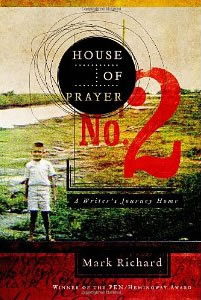Book Notes
 Mark Richard, House of Prayer No. 2; A Writer's Journey Home (New York: Doubleday, 2011), 207pp.
Mark Richard, House of Prayer No. 2; A Writer's Journey Home (New York: Doubleday, 2011), 207pp.
In the rural south of the early 1960s, Mark Richard was labeled a "special child." He spent many months as a young boy in the Crippled Children's Hospital in Richmond, where surgeons drove nails into his deformed hips, put him in a full body cast, and said that by age thirty he would be in a wheelchair for the rest of his life. Neighbors thought he was mentally retarded. Teachers said that he was "different" and that he should be "tested." Big boys bullied him. He feared his father and pitied his mother, both for good reasons.
Somewhere along the way, though, Mark Richard says that he stopped believing in "coincidences." One Easter he saw an angel pass through his living room. His mother brought home grocery sacks of books from the library which he devoured, and his black physical education teacher at school befriended him. He has fond memories of his grandfather, Big Bill, and his second grade teacher, Miss Caroon, who read a story he had written and told his mother, "your boy could be a writer one day if he wanted." Then there's Pastor Ricks of the Holiness House of Prayer No. 2, a lifelong father figure and spiritual force for good.
One day Richard walked into a convenience store to buy beer and picked up a copy of the Atlantic Monthly, only to see that he was a finalist in their short story contest; a college professor had submitted his work without his knowledge. The rest, as they say, is history. His two collections of short stories, The Ice at the Bottom of the World and Charity, have earned numerous awards. He's written a novel called Fishboy, and his work has appeared in the New York Times, The New Yorker, Harpers, GQ, the Paris Review, and Vogue. Today he teaches writing at USC.
House of Prayer No. 2 is Richard's first book of non-fiction. What makes it wonderfully strange is that he's written the entire memoir in the second and third person. The effect suggests the distance and detachment that Richard experienced toward his own body as a child and toward people who marginalized him as "special." His story not only explains how he became a writer; he also tells how he found redemption in a place "where only God knows how close you came to what could have been, and only His grace saved you from it" (emphasis his). By the end of the story Richard has his own call to ministry as the only white congregant at the House of Prayer No. 2, and is slain in the Spirit as Mother Ricks places her hand on his shoulder and testifies about the fulfillment of a dream she had long, long ago.


